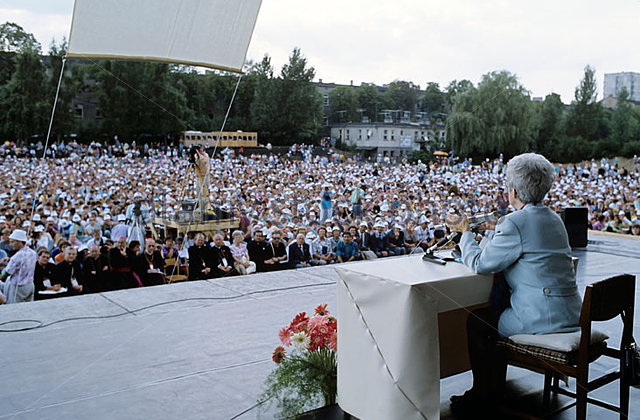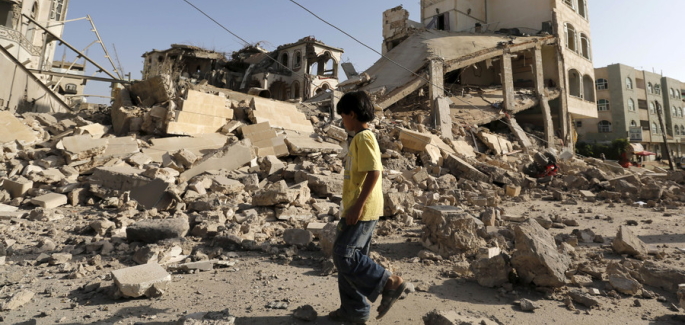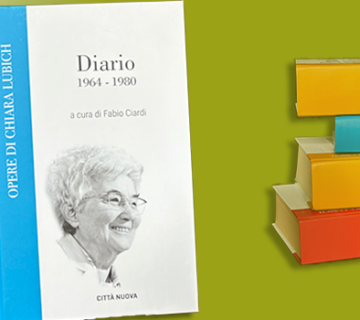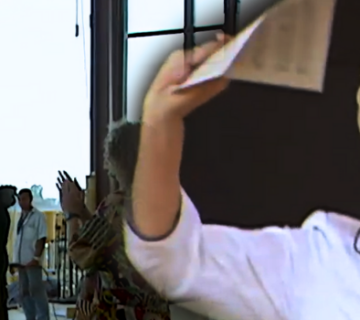 “What should not have happened, has happened: a terrible war has begun and the whole world is holding its breath, fearing it might spread and involve other nations.” It was a few weeks after the US invasion of Iraq, which took place on 17th January 1991, in response to the Iraqi invasion of Kuwait on 2nd August 1990. Chiara Lubich wrote on the subject of peace for Città Nuova magazine. This is taken from an editorial in February 1991.
“What should not have happened, has happened: a terrible war has begun and the whole world is holding its breath, fearing it might spread and involve other nations.” It was a few weeks after the US invasion of Iraq, which took place on 17th January 1991, in response to the Iraqi invasion of Kuwait on 2nd August 1990. Chiara Lubich wrote on the subject of peace for Città Nuova magazine. This is taken from an editorial in February 1991.
“Despite so many prayers, God has permitted the war. Why? Because the will of those responsible for it did not coincide with His will, expressed by the chorus of voices of those who were in the right. The Holy Father, the world’s greatest spiritual and moral authority, summed up these voices in his own constant appeals for peace, affirming the uselessness of war in resolving problems and its inevitable disastrous consequences.
We can only hope that in the mysterious plans of God and because of His infinite love, He will draw something good from this immense evil. We don’t deserve it, but we know the immensity of His mercy.
For this reason and above all so that peace may return, we will not stop praying. On the contrary! Now our “time out” to pray in unity for peace at noon each day will need to be even more intense.
Moreover, we must all feel called in this moment to follow with determination a life style which corrects, at least within us (and through the communion of saints in many others), the mistake that has been made. Human beings have not done the will of God, the will of the God of peace. They did their own will.
We must make every effort, as never before, to carry out the will of God perfectly. “Not my will but yours be done”. Today these words of Jesus must acquire an altogether special importance for us. Compared to His word, everything else must become secondary. We shouldn’t give much importance in our lives to being healthy or sick, to studying or serving, to sleeping or praying, to living or dying. What matters is to make his will our own, to be his will lived out.
This is the way we lived at the beginning of our Movement when, in the setting of another war, the Spirit gave us the light to understand the true value of things. Faced with the destruction caused by hatred, God revealed himself as the one ideal that does not pass, that no bomb could destroy.
God Love, this was the great discovery, a spiritual bomb of such power that it made us literally forget all the bombs falling around us in the war. We discovered that beyond everyone and everything was God who is love, and his providence which makes all things work together for the good of those who love him. We identified the signs of his love in each circumstance, even in the pain of suffering. He loved us immensely. How could we love him in return? It is not the one who says Lord, Lord, who loves me, but the one who does my will.” We could love God by doing his will.
Living like this we got used to listening with every greater attention to “the voice” within us, the voice of our conscience which emphasized the will of God expressed in different ways, through his Word, the duties of our state in life, circumstances, inspirations.
We were certain that God would draw us into a divine adventure, at first unknown to us, where as both spectators and actors in his design of love, we could give the contribution of our own free will, moment by moment.
A short while later he let us see something of our future, helping us see clearly the purpose for which the Movement was coming about: to fulfill Jesus’ prayer in his testament: “Father, may they all be one”, to work together to achieve a more united world.
We can live like this now too. Have we experienced an aburpt and painful change? Do we have to run to air raid shelters often, just like in those far off days? Are we at times fearful, anguished, believing we are going to die? Or are we living life as we always did, with our daily tasks, far from danger? For all of us what matters is what is of most value: not one thing or the other, but God’s will. Let’s ‘listen’ putting his will in the first place in our heart, our memory, our mind; putting before all else, all our strength at his service.
In this way we will rectify, at least in ourselves, the error that has been made. And Christ will stay in our hearts and we will therefore be more together, more united, more ‘one’, sharing everything, praying for one another and for peace to return.”
Chiara Lubich: Attualità leggere il proprio tempo,[Current affairs: reading our own times] Città Nuova Ed., pag.85-87. Originally published in Città Nuova n. 4/1991


 Italiano
Italiano Español
Español Français
Français Português
Português




No comment